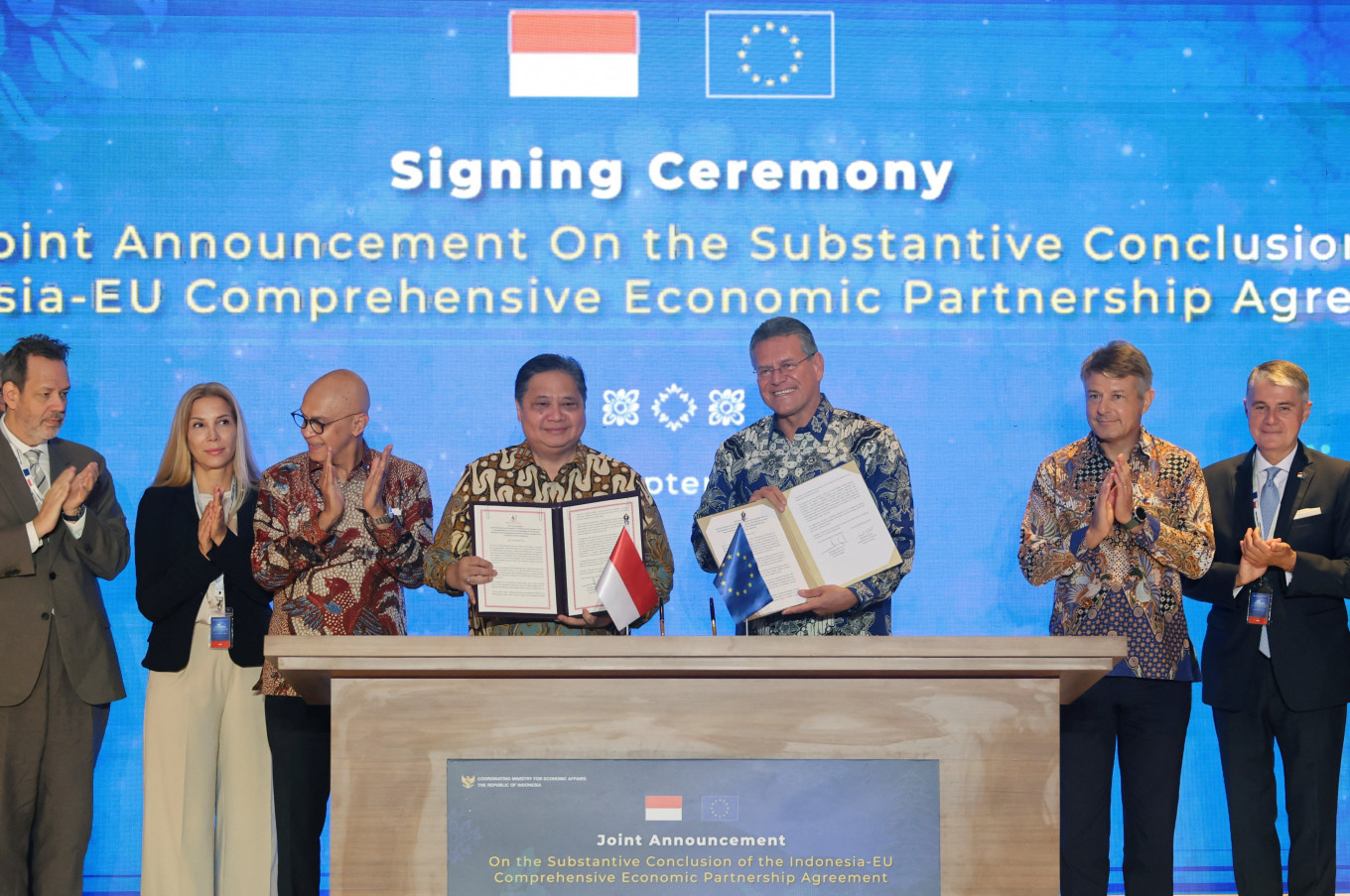Popular Reads
Top Results
Can't find what you're looking for?
View all search resultsPopular Reads
Top Results
Can't find what you're looking for?
View all search resultsIEU-CEPA is ready. Are we?
Change text size
Gift Premium Articles
to Anyone
 Coordinating Economy Minister Airlangga Hartarto and European Commissioner for Trade and Economic Security Maros Sefcovic, show documents during a signing ceremony on the substantive conclusion of the Indonesia-European Union Comprehensive Economic Partnership Agreement (IEU-CEPA) in Nusa Dua, Bali, on Sept. 23, 2025. (REUTERS/Johannes P. Christo)
Coordinating Economy Minister Airlangga Hartarto and European Commissioner for Trade and Economic Security Maros Sefcovic, show documents during a signing ceremony on the substantive conclusion of the Indonesia-European Union Comprehensive Economic Partnership Agreement (IEU-CEPA) in Nusa Dua, Bali, on Sept. 23, 2025. (REUTERS/Johannes P. Christo)
I
t is finally done; Indonesia and the European Union have agreed on a free trade pact that had been in the making for more than a decade.
This is a welcome milestone after numerous deadlines for the promised conclusion of the Comprehensive Economic Partnership Agreement (CEPA) had been missed.
The ceremony held in Bali on Tuesday marked the finalization of the negotiations between the two sides, but the implementation will take time, with Coordinating Economy Minister Airlangga Hartarto setting the first day of 2027 as the target date for the Indonesia-EU CEPA to enter into force.
A free trade agreement between the largest economy of Southeast Asia and the massive EU market, the world’s third-largest, after the United States and China, certainly goes against a global zeitgeist that has grown increasingly protectionist in recent years.
In a world where the WTO framework has become rather useless as a foundation for open cross-border trade, bilateral agreements like this one are all the more important.
Why now, one might ask. Perhaps it took a serious disruption of global trade to get this CEPA past the finish line.
Europe, which traditionally placed its transatlantic relationship with the US above all other international cooperation, has been thrust out of its comfort zone as the US under President Donald Trump pursues reindustrialization with little regard for anyone else.
The top priority for Washington, like for every superpower in history, is to maintain its global dominance, even if that means taking advantage of allies.
Europe, like Indonesia, recently agreed under pressure to a bilateral trade deal with the US that clearly gives them the short end of the stick, accepting US import tariffs while widely opening the gates to their own market for US-made products.
Against this backdrop, both the EU and Indonesia are keen to develop alternative, fairer trade relationships.
This, coupled with emerging markets’ growing role in the global economy, may have persuaded EU negotiators to soften their stance on stumbling blocks that had previously held up progress, like palm oil and biofuel exports from Indonesia.
On Tuesday, just hours after the CEPA ceremony, the EU proposed delaying by another year the implementation of its anti-deforestation regulation (EUDR), which has been a bone of contention in bilateral trade ties.
Indonesian businesses fear the rules would place a heavy burden on them to prove that exported cocoa, soy, timber, cattle, palm oil, rubber and coffee, as well as derivative products based on these commodities, do not contribute to deforestation.
Whether the proposed second postponement of the EUDR is motivated by a desire to facilitate trade deals or rather owed to pressure from EU industries is unclear, but it certainly fits in with a newfound economic pragmatism in Brussels, as several EU countries are struggling.
The long-awaited conclusion of the trade negotiations reflects a mutual understanding that both sides have more to gain than to lose, even if it will not eliminate all differences between Jakarta and Brussels in trade matters.
Some of those differences may come to the fore as we amend regulations to ratify the CEPA, but businesses on both sides have been pushing for the deal for years, and hopefully they will not have to wait much longer for its implementation.
That said, they will need every bit of that time to adjust to new standards, increase their capacity and grow more competitive. EU consumers can be fickle when it comes to social and especially environmental standards.
In their current state, many small and medium enterprises would not be ready to take full advantage of greater access to the EU market. They will need to up their game in quality and quantity, lest free trade become a risk rather than an opportunity for them.
While that is their responsibility, the government should support the process through training and capacity building.
Concluding the CEPA talks is a milestone, but we have a ways to go to ratify it and for our businesses to get into shape.










